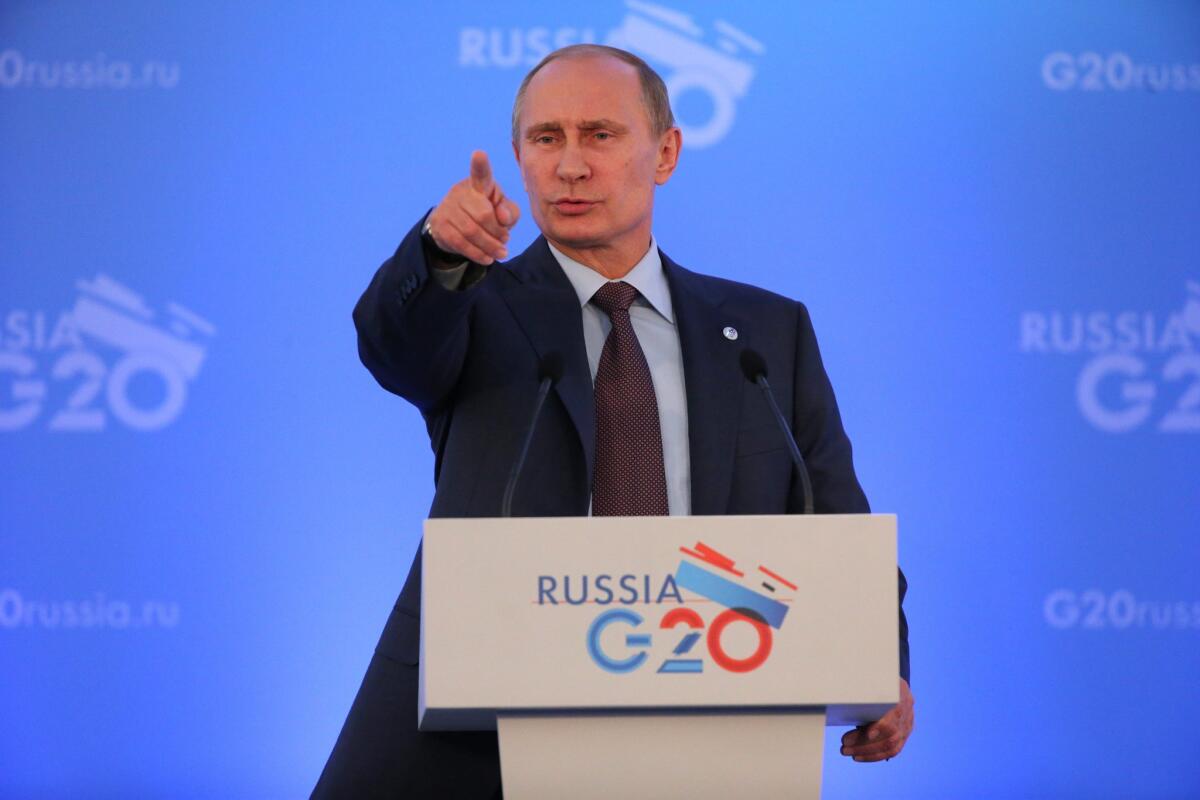The Putin Doctrine

- Share via
For more than a decade — after he replaced Boris Yeltsin in the Kremlin and even during the time he had to serve as prime minister under his protege, Dmitry Medvedev — Russian President Vladimir Putin has systematically and consistently pursued a policy that can be labeled the Putin Doctrine. In a nutshell, Putin seeks to renew Russia’s status and influence in both regional and global politics and make the Russian Federation a great power again. To achieve this goal, he challenges and subverts America’s posture and interests, relying on three main components.
First, Putin orchestrated a comprehensive buildup in the Russian armed forces, using the growing revenue from the country’s energy resources, primarily natural gas and crude oil. For most of the 1990s, Russian policymakers were overwhelmingly preoccupied with political and economic survival, and the defense establishment was one of the main sectors that suffered. Salaries were not paid, bases in the former Soviet republics were abandoned, training was scarce, critical equipment was left to rust and operational preparedness reached an all-time low. Since the early 2000s, when Putin first took office as president, however, Russia’s military budget has tripled and, according to the Stockholm International Peace Research Institute, it currently constitutes 4.4% of Russia’s GDP, or more than $90 billion.
Second, Putin was able to use a number of institutional platforms to frustrate and foil U.S. initiatives he considered harmful to Russian interests. In 2003, before the Iraq war, for example, Russia was successful in blocking the Bush administration from getting a U.N. resolution passed to authorize the use of force against Saddam Hussein. Today, as the Syria crisis unfolds and President Obama is seeking congressional approval for a limited punitive strike against Syria, Russia actively uses its veto power at the U.N. Security Council to preemptively obstruct any American attempt to gain international legitimization for such an attack. Russia follows the same pattern of behavior at the International Atomic Energy Agency when the issue of Iran’s nuclear weapons program is discussed.
Third, Putin crafted an association of states that share his basic anti-American strategic vision for the international system. China has become Russia’s chief ally in frustrating Obama’s foreign policy goals. Whether it is Iran or Syria, the 2009 Copenhagen Climate Change Summit or the global economic crisis, Beijing and Moscow see eye to eye when it comes to the United States. Russia and China are devoted to a multipolar global power configuration that essentially means the erosion of American hyper-power and political predominance.
Putin has also exploited diplomatic friction between the U.S. and its allies. For example, in 2003, during the Iraq war, he met with German Chancellor Gerhard Schroeder and French President Jacques Chirac numerous times to coordinate their antiwar moves within and outside the United Nations.
In the beginning of his presidency, Obama sought to “reset” relations between Washington and Moscow. He even revised some controversial plans to deploy missile systems in Eastern Europe as a trust-building measure designed to appease Putin. Yet the fundamental objectives of the Putin Doctrine made these American gestures ineffective and, in fact, only bolstered Putin’s determination and tenacity.
Putin believes that the U.S. is economically and politically declining and that it is socially degenerating. Indeed, Putin sees the wariness among the American people and their political representatives in the case of Syria and thinks that this is more proof of U.S. weakness and indecisiveness amid Russia’s growing power and influence.
Regardless of the prospects of the Russian proposal to dismantle the Syrian chemical weapons stockpile — an initiative some observers believe is designed to split the White House, Congress and the American public — Putin has shown his diplomatic craftiness and strategic interests in reclaiming Russian involvement in Middle Eastern politics. By positioning Moscow alongside the Bashar Assad government and forcing Obama to blink first, Putin showcased his personal leadership, resolve and willingness to confront the United States. We should expect to see more of this doctrine in action, perhaps in the case of Iran.
The Cold War ended more than two decades ago, but Putin has revived some traits of the Soviet empire, and his doctrine is the key to his success. The Obama administration should realize that Putin’s objectives are diametrically opposed to most American interests and come up with a doctrine of its own to deal with him if it wishes to maintain U.S. national interests over time.
Ilai Z. Saltzman is a visiting assistant professor of government at Claremont McKenna College and a board member of Mitvim, the Israeli Institute for Regional Foreign Policies, a progressive think tank.
More to Read
A cure for the common opinion
Get thought-provoking perspectives with our weekly newsletter.
You may occasionally receive promotional content from the Los Angeles Times.









